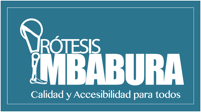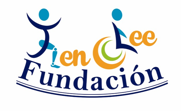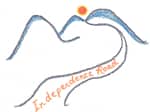Center:
The center is in Ecuador approximately 2 1/2 hours north of Quito on the Pan American Highway.The project, now going into its eleventh year, has an objective to provide low-cost and high-quality prostheses and other rehab devices. Prótesis Imbabura fabricates and fits devices, working in conjunction with Fundación Jen Lee to direct donations of prosthetic components to those who need them.
There are 4 employees and frequent volunteers at the clinic. Patricia answers the phones and keeps our records. Gabriela, Jairo and Alicia are service providers.
Costs:
Costs include travel and living expenses, which are very low in Ecuador. We hope that all volunteers will gather and bring donations of prosthetic and orthotic components that are difficult to obtain in Ecuador. Depending on the airlines, zero, one or two checked bags are free for international travel.
For students, we request that students make a small donation ($500/month) for the opportunity to work and learn at the clinic and for the supervision we can provide you. This is a valuable contribution that allows the clinic to continue to provide for the neediest cases at very low cost or no cost. For example, a child from a family without resources can receive a below-knee prosthesis at a cost of $250.
Directions:
Prótesis Imbabura
Calle Carlos Proaño 21-34 y Av Eugenio Espejo
Ibarra Ecuador
(7 cuadras más arriba del Terminal Terrestre, dirección sur))
Tel: 06-258-5777
cel: 098-551-3931, 098-575-2521, 096-851-9025
Eugenio Espejo is a main thoroughfare that starts at the bus station ; go about 7 blocks from the bus station, turn left on Carlos Proaño and the clinic is the second door on the left.
Arrival to Quito:
Welcome to 9,300 ft. Drink lots of purified water to help you acclimate.
The new airport is north of Quito and there some hotels up there. We like Hotel Quito Airport Suites. We can arrange to have you picked up and brought to Ibarra if we have your flight information. If arriving in the evening, most people prefer to stay overnight near the airport to acclimatize to the altitude, then come up to Ibarra the next morning.
Accommodations:
In some cases we will be able to put up our professional volunteers in our rental house, including family members if they are traveling with you. We ask that our volunteer guests contribute $25 per week for house expenses, to help us cover internet, utilities, rent and final cleaning. We also have access to a rental house just down the road from this one, for $35 per week, when our house is full. There are also hotels in Ibarra from $20 per night.
Typically almuerzo (lunch) is the largest meal of the day. We usually eat in various restaurants close to the clinic which run $2.50-$3.50 per meal. You will have access to a kitchen in your rental house if you wish to cook. Convenience stores near the house have a limited selection; there are two large supermarkets and a wonderful produce and meat market (Mercado Amazonas) downtown.
Address of rental house:
Quinta Wasicocha
Frente el Polideportivo
El Olivo Alto
Ibarra, Ecuador
Weather:
The weather in Ibarra is eternal spring; usually between 60-70 degrees F, occasionally 55 – 80 degrees. During the rainy season (Nov – March) it rains occasionally but usually at night. The sun is very strong due to altitude and proximity to the equator. Bring sun screen and light jacket. If you plan to hike and/or go to the hot baths, please bring appropriate gear.
Hints:
Money: The U.S. dollar is the money used in Ecuador. Things are inexpensive (by US standards) so it helps if you have small denomination bills and change. Some stores and restaurants will have difficulty breaking $20 bill; $50 and $100 bills are pretty much impossible to use, even at a bank. ATMs are prevalent. The cost of a cab ride within Ibarra is between US $1.25 – $4.00. Cabs now use taximeters.
Safety and health: Ibarra is considered to have potable water That being said, we don’t drink the tap water when we are in Ecuador just to be on the safe side. Drink bottled, boiled, or purified water only and be mindful that (restaurant) salads are washed in unpurified water. Fruit juice is also something that is diluted with unpurified water and is a staple on the lunch and breakfast table. Then again, missing out on all the cool fruits they have in Ecuador (tomato tree, guanabana…) might be a big shame so many people drink small to moderate quantities of it. Lots of other travelers seem to drink copious quantities of it with no ill effects, so you’ll have to decide what to do on your own.
There are biting little insects called Sancuros that will get you in locations where there is grass. Many people from cold climates are very reactive to these bites and can often receive 30 or more bites, so use caution if you plan to wear shorts. Insect repellent and/or long pants are highly recommended.
The sun is more fierce than you are probably used to for two reasons: its rays are direct because we are on the equator, and they are stronger in the thin atmosphere at this altitude. It takes about 10 minutes to get a sunburn, even when cloudy. Few people seem to take this information to heart and most get burned, but I’m just letting you know…..Suncreen recommended every day.
If you plan to travel outside the mountain region of Ecuador, visit your state department website regarding vaccinations, malaria and other tropical disease recomendations. US state department recommendations concerning immunizations.:http://app/publicnc.cdc.gov/travel/destinations/ecuador.htm The coastal and jungle areas have different recommendations than the mountain region that Ibarra is in.
Be mindful of your stuff and exercise caution. Ecuador is a relatively safe country but there are pickpockets, muggers and con artists in all parts of the world.
Customs and immigration: No visa is required ahead of time from most countries; you will receive a 90 day tourist visa when you arrive. You will need to show a return ticket or ticket to another country in order to receive the visa.
There is no problem bringing in a phone and a computer or small electronic device, or a small amount of prosthetic components. if you have orthotic or prosthetic components or tools to donate, it is possible to check one or two large size suitcases, max 50 Lb (23 Kg) for each suitcase; baggage fees vary depending on airlines. Metal parts sometimes attract unwanted customs attention, so please contact us in advance so that we can arrange customs documents.
Internet connectivity: There is internet wifi at the center, at the rental house, and in many other rentals or hotels. There are internet cafes in the area. Free wifi can be also found at one of Ibarra’s main squares in the center of town although its high usage can kick you off of it intermittently.
Telephone: Several options, and constantly evolving. You can add an international plan to your phone, you can bring an unlocked phone and add a sim card purchased in Ecuador, you can buy a cheap Ecuadoran phone to use there (our option), or you can get by using What’s App, FaceTime, or Skype for international calls. There is also the possibility of the exotic freedom of a less phone-based life.
Bob Frank, US clinical director of the center, can be reached on his Ecuadorian cell phone during your trip. His number is 096-919-1339 (If calling from outside of Ecuador, don’t forget to dial an access code first, 593. Also he uses What’s App). His state side number is 828-606-8952. Email: bobkitfrank@gmail.com. Kit Frank: US cell phone 828 774-7222 (also WhatsApp in any country). They will be in Ecuador July-August 2019 and November 2019-January 2020. Bob and Kit Frank are both volunteers who spend about five months per year at the center. The center, Prótesis Imbabura, listed above, can also be called and is open M-F during the day. Spanish is the only language spoken at the center unless an American team is present.
Ibarra:
Welcome to “the White City”, so named for its architecture.
Located in the Northern Highlands of Ecuador, it is also the capital of Imbabura Province. The city isn’t a tourist city but it is a nice place nevertheless and there are fantastic things to do. First of all, you should eat helado de paila (a type of sherbet for which this area is famous). Don’t miss the empanadas (.80-$1.00 per)–ask Bob where to get the best ones. And definitely eat the tilapia fish dinner down at the lake (which has its own history) and enjoy the carnival-like atmosphere there on the weekends.
Touring the area:
Otavalo: A short bus ride or cab ride away, is a town featured in the book “1000 places to see before you die”. Known as “the oldest, best-known and most important Indian Market” in South America, the market occurs every weekend in Otavalo. The square is packed with vendors and these overflow into the streets. But you don’t have to go there just on a weekend, (although that is the biggest spectacle) the market runs through the week on a smaller scale in the “plaza de ponchos”. What to buy? alpaca and wool products (blankets, sweaters, hats, scarves etc.), hammocks (I have a great one for my front porch), pottery, art. The local atmosphere is great.
Peguche: Waterfall just outside Otavalo, which is gorgeous and a short hike and includes some Inca heritage info.
San Antonio de Ibarra: Just outside of Ibarra, this town is famous for it’s wood carving.
Cotacachi: Another short cab or bus ride from Ibarra is the town of Cotacachi. Several expat communities are in this area. This is the “leather goods” town. The leather goods the families produce here are exported all over the world. Bargain well and you can come away with some nice things and the town is nice too with its cobblestone streets. It feels very calm here compared to the bustle of Ibarra.
Chachimbiro: “The baths” are another short ride from Ibarra is a town that has natural hot springs. There are two places to partake. Bring your suit and relax in the cold, medium, or hot temps or try out the natural Sauna where they put Eucalyptus branches so the scent clears out your sinuses. The baths are a place you can go in the evening, or on the weekends when it is a family scene.
Quito: Quito is about 2 ½ hours south of Ibarra. There are many hotels in Quito with many different price points. Most of us go the budget route and stay in Old Town at the Hotel de San Francisco (02/2287-758)–from the U.S. dial 593 (access code for Ecuador) 2-2287-758. The rooms there are approximately $35/pp double occupancy and they serve breakfast in their cafe. Old town is nice to walk around in and see the sites, but use city smarts while walking around and consider taking cabs at night. On Sunday mornings they close many of the streets to traffic and it is especially nice for strolling. Another hotel we stay in is the Hotel Savoy Inn which is very close to the old airport. A room is approximately $60/pp including breakfast. Bob says this place has the best hot water showers in Ecuador….
Hiking/scrambling:
Cuicocha lake is near Cotacachi and has fantastic views. You can hike for 1/2 hour, or go all the way around the lake in 4 hours.
Imbabura (15,000+ ft) volcano can be climbed with a local (often Indian) guide. These trips usually occur on a weekend as the round-trip hike is long. Ask Bob who to call to set this up.
Culbiche is a 2 hour climb for the less ambitious or to acclimatize in preparation for bigger climbs. You may want gloves, to protect your hands for the slide-on-your-butt way down.
Cayambe Volcano( summit is at 19,000 ft) is about a 2 hour drive from Ibarra and the road goes about ⅓ the way up the mountain. It is then a hike to approximately 15k+ feet to the refugio, usually on snow. If you are a climber with experience on glaciers, take a guide and try to go all the way to the summit. Cayambe is the third tallest mountain in Ecuador and it crosses the equator.
Riding:
Horseback riding can be done with a guided service near Otavalo. Volunteers have left the early in the afternoon and ridden to waterfall and were back at their start point as it was getting dark, they said the horses exuberantly galloped back.
Andean Condor:
If you want to see one of the most endangered and ugliest raptors in the world (also largest wingspan in the world), go to Parque Condor, a beautiful aviary and rescue operation with indigenous species and beautiful landscaping with a 360 degree view.. They have falconry demonstrations at 11:30 and 3:00 pm.
The Equator:
On the way to and from Quito, one will cross the equator. There is the real? equator crossing with a monument that you can stand near and take the obligatory photo of you standing with one foot in the North and one in the South. However, more recent careful measuring point to a different spot as being the true crossing.
Don’t forget your passport, and be prepared to…work hard AND have fun. We hope that your time with us will be as memorable as it always is for us.


